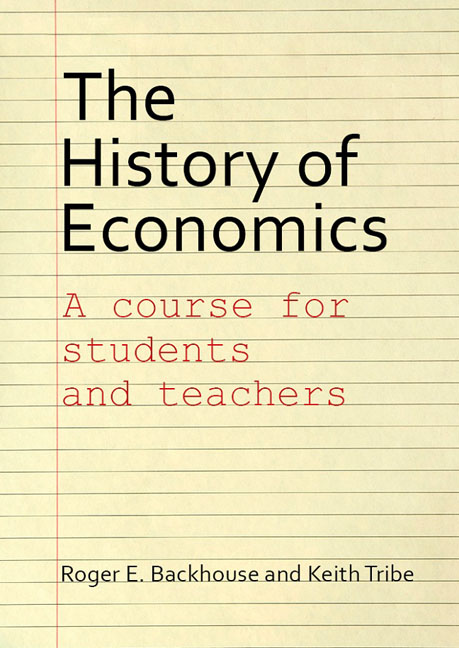Book contents
- Frontmatter
- Contents
- Introduction
- Lecture 1 Commerce, Wealth and Power: The Disputed Foundations of the Strength of a Nation
- Lecture 2 Natural Order, Physiocracy and Reform
- Lecture 3 Adam Smith I: Outline of a Project
- Lecture 4 Adam Smith II: The Two Texts
- Lecture 5 The Political Economy of Malthus and Ricardo
- Lecture 6 Political Economy in Continental Europe and the United States
- Lecture 7 Political Economy, Philosophic Radicalism and John Stuart Mill
- Lecture 8 Popular Political Economy: List, Carey, Bastiat and George
- Lecture 9 Radical Political Economy: Marx and His Sources
- Lecture 10 Marginalism and Subjectivism: Jevons and Edgeworth
- Lecture 11 From Political Economy to Economics
- Lecture 12 Alfred Marshall’s Project
- Lecture 13 Markets and Welfare after Marshall
- Lecture 14 Monetary Economics
- Lecture 15 The Rise of Mathematical Economics
- Lecture 16 Robbins’s Essay and the Definition of Economics
- Lecture 17 John Maynard Keynes
- Lecture 18 Quantitative Economics
- Lecture 19 The Keynesian Revolution
- Lecture 20 Modern Macroeconomics
- Lecture 21 Inflation and the Phillips Curve
- Lecture 22 Popular Economics
- Lecture 23 Economics and Policy
- Lecture 24 Ideology and Place
- Index
Lecture 11 - From Political Economy to Economics
Published online by Cambridge University Press: 09 August 2023
- Frontmatter
- Contents
- Introduction
- Lecture 1 Commerce, Wealth and Power: The Disputed Foundations of the Strength of a Nation
- Lecture 2 Natural Order, Physiocracy and Reform
- Lecture 3 Adam Smith I: Outline of a Project
- Lecture 4 Adam Smith II: The Two Texts
- Lecture 5 The Political Economy of Malthus and Ricardo
- Lecture 6 Political Economy in Continental Europe and the United States
- Lecture 7 Political Economy, Philosophic Radicalism and John Stuart Mill
- Lecture 8 Popular Political Economy: List, Carey, Bastiat and George
- Lecture 9 Radical Political Economy: Marx and His Sources
- Lecture 10 Marginalism and Subjectivism: Jevons and Edgeworth
- Lecture 11 From Political Economy to Economics
- Lecture 12 Alfred Marshall’s Project
- Lecture 13 Markets and Welfare after Marshall
- Lecture 14 Monetary Economics
- Lecture 15 The Rise of Mathematical Economics
- Lecture 16 Robbins’s Essay and the Definition of Economics
- Lecture 17 John Maynard Keynes
- Lecture 18 Quantitative Economics
- Lecture 19 The Keynesian Revolution
- Lecture 20 Modern Macroeconomics
- Lecture 21 Inflation and the Phillips Curve
- Lecture 22 Popular Economics
- Lecture 23 Economics and Policy
- Lecture 24 Ideology and Place
- Index
Summary
Aims of the lecture
1. To demonstrate that, by the later 1880s, there was a broad international consensus that a “modern” economics centred on the choices made by an economic agent, and not on a framework of production and distribution involving land, labour and capital.
2. To emphasize that while Walras pursued a complex algebraic approach to this problem that provided the foundations of general equilibrium analysis, he regarded his work as part of this general line of thinking, not as separate from it.
3. To emphasize that while there was some diversity in approach to economic analysis, there was no imperative to reduce this variety to uniformity.
Bibliography
The reference text for Carl Menger is the four-volume Gesammelte Werke (Tübingen: Mohr Siebeck, 1968–70) edited by Friedrich von Hayek. For Walras the reference text is the fourteen-volume Oeuvres Économiques Complètes of Auguste and Léon Walras, edited by Pierre Dockès et al. (Paris: Economica, 1987–2005).
There are modern English translations of the principal works of Walras and Pareto. For Léon Walras, see Elements of Theoretical Economics: Or, The Theory of Social Wealth, (Cambridge: Cambridge University Press, 2014), and for Vilfredo Pareto see Manual of Political Economy, A Critical and Variorum Edition, Aldo Montesano, Alberto Zanni, Luigino Bruni, John S. Chipman and Michael McLure (eds) (Oxford: Oxford University Press, 2014).
An older but still usable translation of Menger’s Grundsätze published by the Ludwig von Mises Institute (2007) is available, but unfortunately it is marred by introductions by Peter G. Klein and Friedrich von Hayek that are best ignored for our purposes here. Indeed, much of the commentary to be found on the web relating to Menger and Walras is questionable, in terms of both scholarly reliability and judgement. Besides the work of Yagi and Endres noted here, you will generally find that commentary that is contemporary with the immediate reception of Menger’s work is far more illuminating than anything written since. The problem with commentary on Walras is rather different; the development of general equilibrium theory “creatively” modified Walras in a way that obscured the qualifications and reservations that he had made, progressively distorting later understanding of his work.
- Type
- Chapter
- Information
- The History of EconomicsA Course for Students and Teachers, pp. 169 - 184Publisher: Agenda PublishingPrint publication year: 2017



